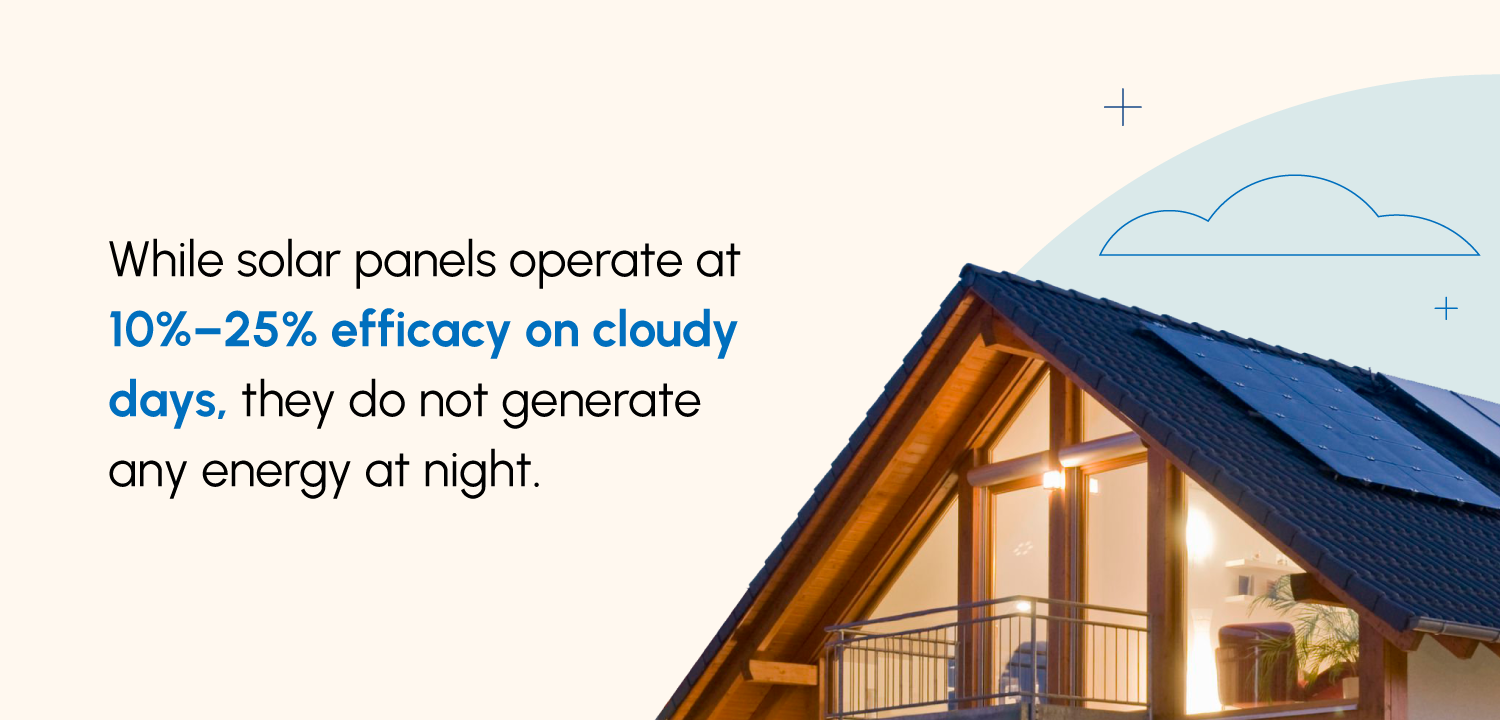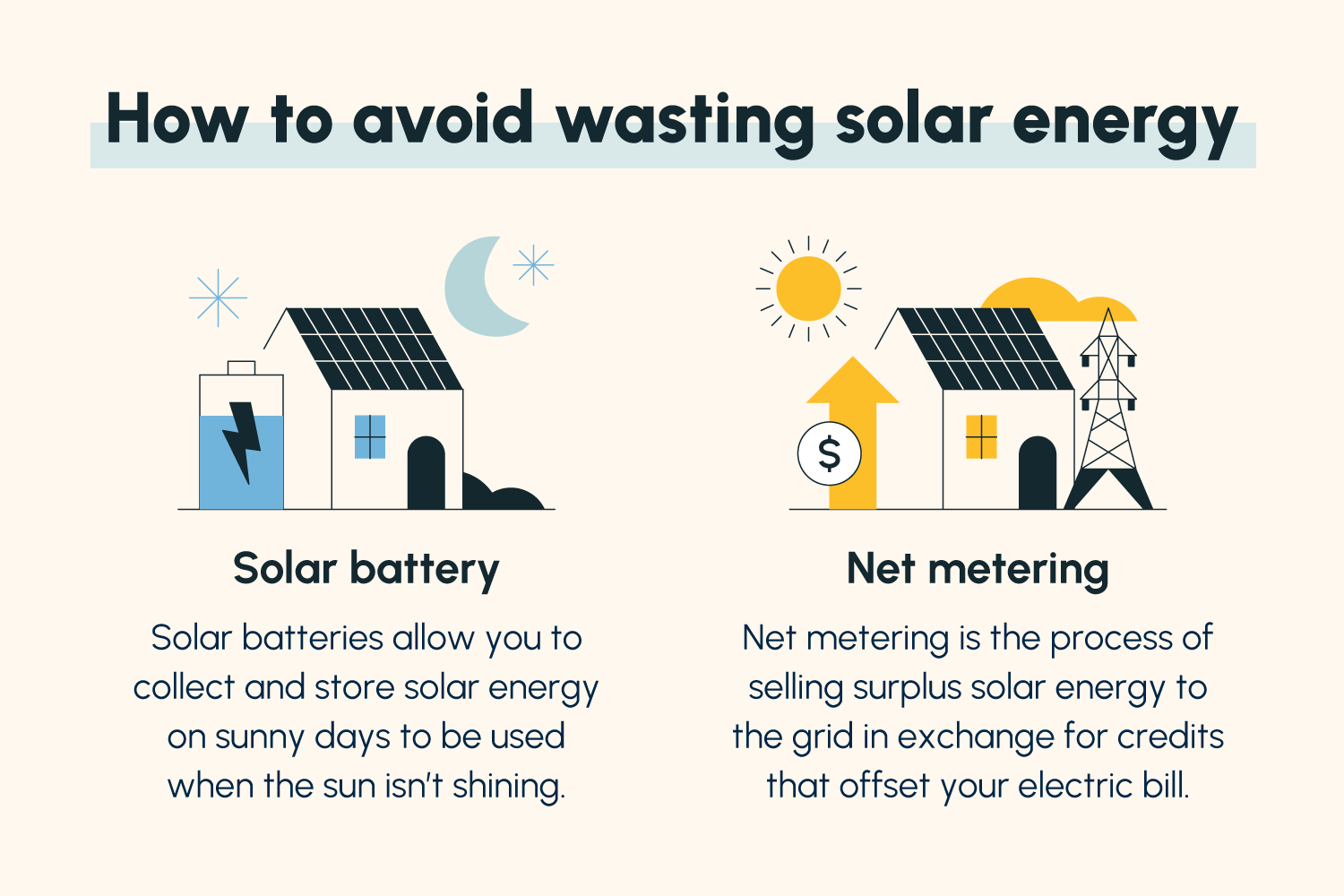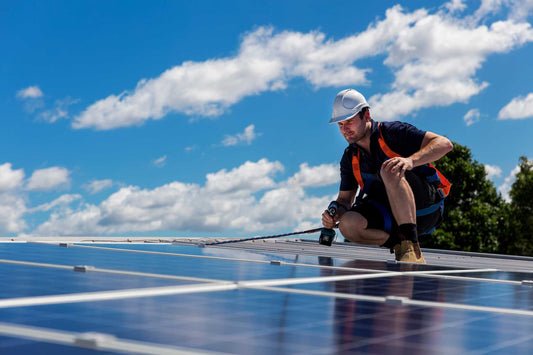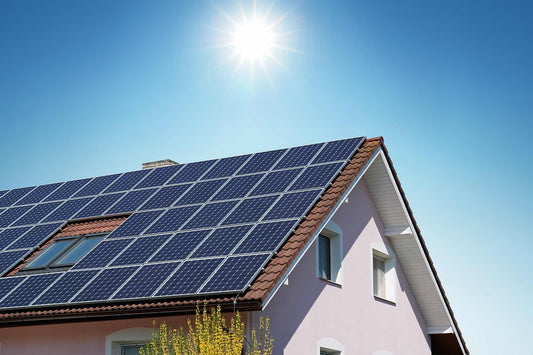Everyone knows that solar panels rely on the sun to function. After all, Merriam-Webster Dictionary defines “solar” as “utilizing the sun's rays especially to produce heat or electricity.”
This may make you wonder, do solar panels work on cloudy days? What about at night? For homeowners who don’t live in an area where the sun is always shining, these are important considerations before investing in a solar system.
Before you conclude that solar panels don’t work when the sun is obstructed, think back to a time that you didn’t wear sunscreen on a cloudy day and still got burnt. When it comes to the power of the sun’s rays, cloud coverage can be deceiving.
While solar panels work at peak efficacy in direct sunlight, they still generate energy from indirect sunlight.
In this guide, we discuss how solar panels function during suboptimal weather conditions and how to make solar work for you, no matter where you live.
Do Solar Panels Work on Cloudy Days?
Does solar work on cloudy days? The simple answer is yes — solar panels do work on cloudy days. Photovoltaic (PV) panels can use both direct and indirect sunlight to generate power.
That said, cloudy weather does inhibit solar energy production. You can expect your panels to produce 10%-25% of their normal power output on very cloudy days. On partially cloudy days, they should perform much better than this — close to their maximum potential.
Is Solar Worth It for Homeowners in Cloudier States?

If you live in an area that has pretty regular cloud coverage, don’t fret. Just because solar panels don’t work best on overcast days doesn’t mean investing in solar isn’t worthwhile.
To prove it, let’s compare a couple states that get different amounts of sunlight and have different energy prices.
On average, Texas gets 2,850 hours of sunlight per year. Maine, on the other hand, gets 2,513 hours. That’s nearly 12% more sunlight in Texas than Maine.
However, before you assume that solar is a better investment in Texas than in Maine, it’s important to also consider the price of electricity in each state.
In Texas, the average cost of residential electricity is $0.12/kWh. In Maine, it’s over $0.18/kWh. So even though Texas gets 12% more sunlight than Maine, Maine’s energy price is 33% higher than that of Texas. Your savings from going solar in Maine would actually be higher than your savings in Texas, despite having fewer hours of sunlight.
Is Hot Weather Best for Solar Energy Production?
While sunny weather tends to correlate with hotter weather, you may be surprised to learn that solar panels do not work best in very hot climates.
In fact, once temperatures exceed 77°F, solar panels begin slowly decreasing in efficiency. While this decrease is very gradual, if they get hot enough this can have a notable impact on their performance.
Generally, solar panels work best in sunny areas with moderate temperatures.
How Does Rain Affect Solar Panels?
It’s often assumed that rain is just as bad as cloud coverage for solar panel efficiency since rain and clouds go hand in hand.
In reality, rain serves a valuable purpose for solar panels, washing them clean of any dust, dirt, and debris that may have been preventing them from absorbing sunlight.
Do Solar Panels Work at Night?

Solar panels can use indirect sunlight in the midst of cloud coverage to generate electricity, so can you collect solar energy at night, too? Unfortunately, solar panels do not generate energy at night.
Solar panels function as a result of the photovoltaic effect. This is a physical and chemical process that causes the generation of voltage inside a material as a result of exposure to light. It’s what happens when the PV cells in solar panels turn sunlight into electricity.
At night, there isn’t nearly enough light for this process to take place, sending your solar panels into a “sleep mode” of sorts. Of course, light from the moon and neighborhood street lights can technically produce tiny amounts of energy, but the quantity is negligible.
Storing Solar Energy for Cloudy Days and Nighttime
While solar panels don’t generate energy at night and only operate at a fraction of their potential during cloudy days, you can still prepare for your energy needs during times of low production. Let’s explore a couple ways to do this.
Store Surplus Energy in a Solar Battery
Modern solar systems produce more energy than most homes use. Rather than letting that surplus energy go to waste, invest in a solar battery to store it for nighttime and long periods of overcast weather.
Before buying a battery, remember to take into consideration the following:
- Quantity needed: If you want to save enough energy to power your home for an entire day or longer, you’ll probably need to invest in multiple batteries. Calculate your energy usage to determine how many batteries you need.
- Space: Solar batteries usually aren’t tiny. Make sure you have enough space on your wall to mount them and connect them to your solar system.
- Budget: Of course, while a worthy investment, batteries will add to the cost of your solar system. Make sure your budget allows for the extra cost of batteries, and consider buying one at a time to ease any financial strain.
Use Net Metering

Some days, you may use more energy than your solar panels produce. If you don’t have fully charged solar batteries at the ready, you may want to try net metering.
Net metering is the process of sending extra electric power that your solar system generates into your local electrical grid. In return, your utility company sends you credits, which you can use to offset extra electric costs on days of suboptimal solar energy production.
If you’re interested in net metering, be sure to consider the following:
- Availability: Not every city and/or utility company offers a net metering program, and rates differ greatly across locales. Some will pay you what you pay them for electricity while others will only pay you a fraction of what you pay. Confirm that your area offers a program with a reasonable rate before settling on this option.
- Energy generation: Sometimes, you may not generate enough energy to sell to the grid. As a result, you may still owe money to your utility company on the days that you need more energy than your solar system generates.
FAQ: Solar Energy on Cloudy Days and at Night
Not every part of the nation gets sunlight year-round, so it’s natural to wonder how your solar panels will perform when the sun isn’t shining. Below, we answer some common questions about solar panel performance during times of suboptimal sunlight.
Do Solar Panels Store Energy for Night Use?
Most solar systems generate surplus energy during sunny days that can be used at night. However, this energy can only be stored if you have batteries.
If you want to collect your solar system’s surplus energy to be used when you aren’t generating as much energy, you’ll have to invest in solar batteries. Alternatively, you can sell your surplus energy back to your local power grid via a net metering program, if your area offers one.
How Effective Are Solar Panels on a Cloudy Day?
On a very cloudy day, solar panels usually operate at 10%-25% efficiency. On a partially cloudy day, they should operate at a higher efficiency — somewhere around 50%-80%.
This is because cloud coverage obstructs rays of sunlight from reaching solar panels. Indirect sunlight doesn’t provide as much solar energy to solar panels as direct sunlight.
How Do Solar Panels Work If There Is No Sun?
There are three conditions that keep the sun’s rays from directly reaching solar panels: cloud coverage, shade, and nighttime.
Cloud coverage results in more indirect than direct sunlight. Solar panels can produce energy using indirect sunlight, but they produce less than if they had direct exposure to sunlight.
Similarly, shade (from a tree, for example) obstructs the sun’s rays and limits solar panel efficacy. When mapping out where to install solar panels, it’s a good idea to avoid areas covered by shade.
When the sun has gone down and the neighborhood street lights have turned on, solar panels are no longer generating energy. You’ll have to rely on energy stored in solar batteries or energy from your utility company when using appliances at night.
Do Solar Panels Work on Snowy Days?
Typically, when there’s snow there’s also cloud coverage. While this cloud coverage does impede solar energy production, snow itself doesn’t pose much of an issue unless it builds up and significantly covers your solar panels.
In most cases, however, a dusting of snow will get blown away by the wind and won’t impact solar energy generation.
Ready to get started on building your own solar system?
With Solartap, you can feel confident you’re getting the most out of your solar system no matter the weather. We source our panels and batteries from reliable manufacturers who keep efficiency top of mind.
Don’t wait to plan out your solar system — get a free quote today using our solar panel calculator.




